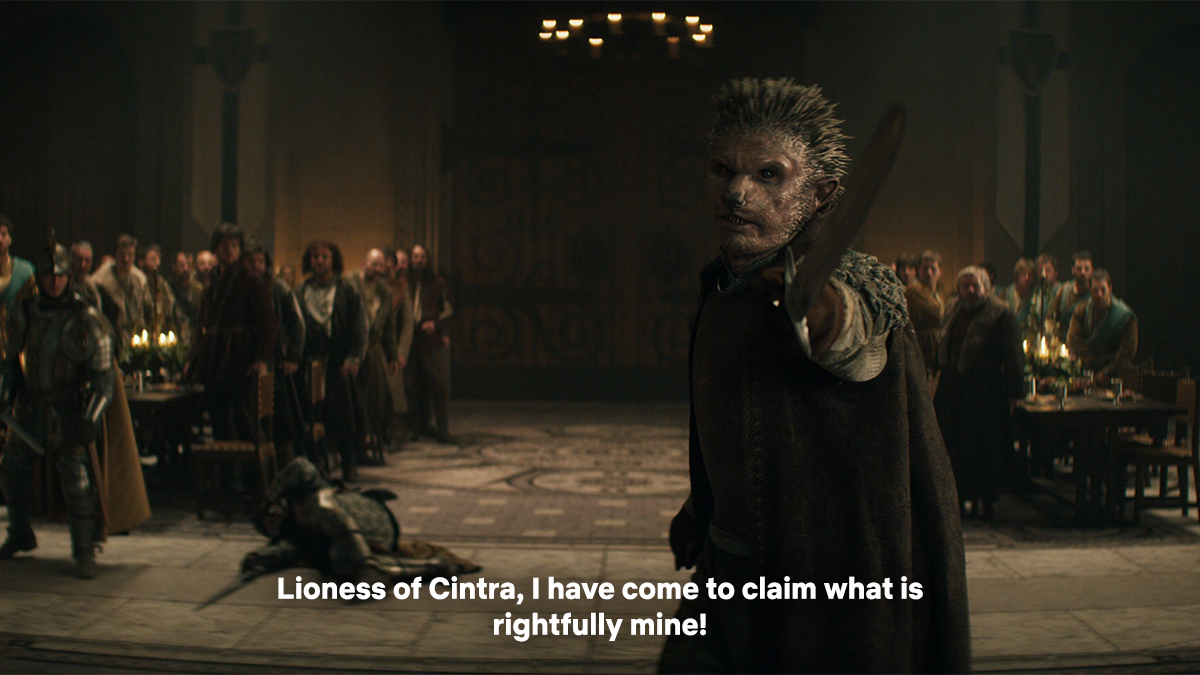
The world of The Witcher is one full of magic, intrigue, and, let’s be honest here, Henry Cavill’s abs. But aside from Cavill’s Geralt, the titular witcher of the series, there are a number of other powerful and interesting characters sharing the spotlight. Included in the main cast are Yennefer of Vengerberg, a formidable sorceress and Geralt’s love interest, and Cirilla, also nicknamed “Ciri”, the crown princess of Cintra who is prophecized to have unfathomable magical abilities.
While the Netflix series has several differences from the 2015 hit game The Witcher 3: Wild Hunt, there’s a common thread between the two that drives their plots forward and binds the characters closer together. Despite the gritty fantasy world of Andrzej Sapkowski’s The Witcher novels, Sapkowski makes heavy use of a central concept that’s common in many books, shows, and games in the fantasy genre: destiny.
In The Witcher, destiny shapes the lives of every character and it does it best through a custom called the “law of surprise”.
What Is Destiny in “The Witcher”?

The first of The Witcher games explains what destiny is and what it means to the people who live in Sapkowski’s fantasy universe. According to the glossary entry, destiny is a “mysterious force” that determines the fate of every person who has lived, lives, and will ever live. If that sounds a bit grim and deterministic, even the believers of destiny don’t believe it’s completely inescapable.
Apparently, you can choose whether you’d like to follow your destiny or if you’d prefer to forge your own path. Similar to common beliefs in our world, fighting against destiny is seen as fighting an uphill battle. It’s easier and less risky to follow your predetermined fate as choosing to exercise free will often has nasty consequences.
There are two major ways that destiny shows up in The Witcher books, games, and movies. The first one is the law of surprise and the second is in the form of the wishes made by Geralt and Yennefer to a djinn.
The Law of Surprise and How It Works

According to the lore of The Witcher book series, the Law of Surprise is a custom “as old as humanity itself”, a description that plays into the folkloric and even religious undertones of the concept of destiny. It’s typically used when a person saves the life of another. Though it’s intended as a prize for the savior, it’s the saved party who offers the Law of Surprise.
Once they mention that they’re willing to provide what the savior asks, the savior can then say that they claim the Law of Surprise. The claim is typically staked in two ways. The first response is for the savior to say that they want “The first thing that comes to greet you.” Another way to do it is to say that you want “What you find at home yet don’t expect.”
It sounds very mystical and all, but imagine doing that in real life. “What you find at home yet don’t expect” could easily be a burned-down house, unwashed dishes your roommates left for you to clean, or maybe another person’s car parked on your spot. Destiny mishaps like that also happen in the world of The Witcher.
Picture this: you ask someone for the first thing that comes to greet them but it’s their nagging parent, spouse, or in law. It could also be a very happy dog who has no idea its master just signed away its destiny. Another comedic example in the world of The Witcher is for “what you find at home yet don’t expect” to be a cheating spouse’s lover.
Normally, though? It results in the saved person’s child being the unexpected prize.
This is where it hits the fan in The Witcher universe. It all starts when one mysterious knight claims the Law of Surprise after saving a king.
How the Law of Surprise Shapes the World of “The Witcher”

We’re first introduced to the Law of Surprise in Netflix’s The Witcher during episode four, “Of Banquets, Bastards, and Burials” as a helmeted knight enters the throne room of Queen Calanthe, the Lioness of Cintra who ruled as regent after the death of her husband King Roegner.
The unknown knight explains that he comes in peace and only sneaked past the guards because he needed to speak with Queen Calanthe. The stone-faced queen watches as he kneels and introduces himself as “Lord Urcheon of Erlenwald” who is actually the monstrous creature, Duny. He explains that he came to marry Pavetta, the daughter of Queen Calanthe and King Roegner.
When Duny’s face is revealed by force and Queen Calanthe orders her guards to kill him, he has no choice but to proclaim that Pavetta is his prize by virtue of the Law of Surprise.
For obvious reasons, Queen Calanthe is enraged by the idea that her husband handed their daughter away to a humanoid hedgehog. But Eist explains that the Law of Surprise is anything but a swindle.

How is it that there’s no fraud involved in trading a human life? Eist Tuirseach points out that the Law of Surprise is an “honest gamble” for one particular reason: neither of the parties involved in the deal knows what’s going to be traded between them. The surprise claimed could be anything from a newborn puppy to, say, princesses as in the case of Pavetta and Ciri. More on that later.
But Queen Calanthe is not happy. She has no patience for respecting powers that be that are greater than her own influence. She attempts to kill Duny anyway in order to avoid having to pay back the debt. Legally speaking, debt never dies and if it couldn’t die with King Roegner, it wouldn’t die with Duny either.
But there’s one crucial part of this scene that left a lot of viewers confused. Between all the drama and magic going on around Duny and Pavetta, there’s one moment after Duny stakes his claim that many viewers forget.
As one of the knights tried to cleave Duny in half with a halberd, Geralt stepped in to break the shaft, saving Duny’s life in the process. Let’s spell that out: Geralt saved Duny’s life.
After Queen Calanthe finally accepts the Law of Surprise and Duny’s hedgehog curse is lifted, he offers for Geralt to name any prize Duny can offer. Geralt, with his sarcastic and dry sense of humor, irreverently claims the Law of Surprise. As if on queue, Pavetta throws up and the deal with destiny is sealed.
Geralt has his own surprise child: Ciri.
Could the Law of Surprise Be Legally Enforceable in Real Life?

Believe it or not, the Law of Surprise exists in the real world, too. At least, it has existed at one point.
Let’s start with the folkloric counterparts. What other story involves a cursed beast of a man being restored to his original form after receiving a woman’s love? If you guessed Beauty and the Beast, you’re right. But it gets even more specific. A version of the fairytale appears in “Contes Populaires de Lorraine” written by Emmanuel Cosquin.
Published in 1887, the book includes a story entitled “The White Wolf” where a man cursed to become a white wolf finds a man taking a rose from his castle. The man begs the wolf not to kill him and the wolf agrees on one condition: that the man brings back the first person to greet him on his way home.
Folklore aside, the next question is whether you can actually enforce it. The characters in the show, games, and books keep calling the Law of Surprise a law and they honor it out of custom and fear of the consequences of destiny being upset about them reneging on their word. Other than that, there’s really no codified black letter legislation that enforces the Law of Surprise, making it fall under the realm of common law.
Thankfully, Amgen Law, an actual law firm based in the U.K, breaks it down for us.
From what we know about the Law of Surprise, it’s a form of payment given after a service is rendered. Assuming that you could actually pay with other people’s lives or that there’s a caveat that it has to be anything but a person’s life, there’s still the matter of not knowing what is actually being agreed upon.
Though Eist describes it as a fair deal, real laws operate on precise language. The ambiguity of the Law of Surprise makes it vulnerable to manipulation. Even if Geralt could have gotten a surprise child, Duny could have just shrugged and said he sort of expected it considering that despite the magic of The Witcher, Ciri is definitely not a product of immaculate conception.
There’s also the question of when the contract starts to exist. Contracts are typically defined as “a meeting of minds”, that is, that the two parties agree on the terms provided. But the Law of Surprise only kicks into gear after the service is rendered, when a person’s life is saved. There’s no prior agreement that a life would be saved in exchange for an unknown something waiting at the saved person’s home.
So how about in other jurisdictions? In U.S law, there’s a little legal fiction called a “quasi-contract“. As you can probably guess, it’s a “quasi” contract because it isn’t really a true contract. Quasi-contracts exist by virtue of legal fiction and are imposed by law to prevent unjust enrichment. This doesn’t mean that one party steals from the other.
Unjust enrichment happens when one party benefits from something that another party did for them without the giver being compensated for it. When this happens, the law creates a contract between the two parties in order to give the benefactor their just compensation.
In that case, it wouldn’t matter when the Law of Surprise was invoked since it becomes a quasi-contract that is able to apply retroactively and without the agreement of both parties.
If you think about it this way, the Law of Surprise is a quasi-contract and destiny is a court of law.
But there’s another issue Amgen Law found with the Law of Surprise: most of the time, it isn’t a written contract. Fortunately, contracts don’t always have to be in writing under U.S law. As long as what’s being claimed in the Law of Surprise doesn’t fall under the list of situations that the statute of frauds says has to be in writing in order to be enforceable, then you’re good to go.
In any case, Geralt has a stronger claim under the Law of Surprise than Duny does. While Duny seems to have no witnesses to what is already a verbal contract in The Witcher universe, Geralt does. He’s got an entire hall of them, in fact.
Overly wrought attempts at legal analysis of fiction aside, the Law of Surprise is definitely a driving force in the world of The Witcher series. Let’s just be thankful that hyper-ambiguous quasi-contracts that entail a form of human trafficking don’t exist in real life. I hope.
For legal reasons, any discussions on the legal applications of the Law of Surprise written above are not and should not be taken as legal advice. Make deals with suspicious hedgehog men at your own risk.
If there are any real lawyers out there, feel free to comment below and let us know your thoughts on how the Law of Surprise would work or fail in your jurisdiction!





